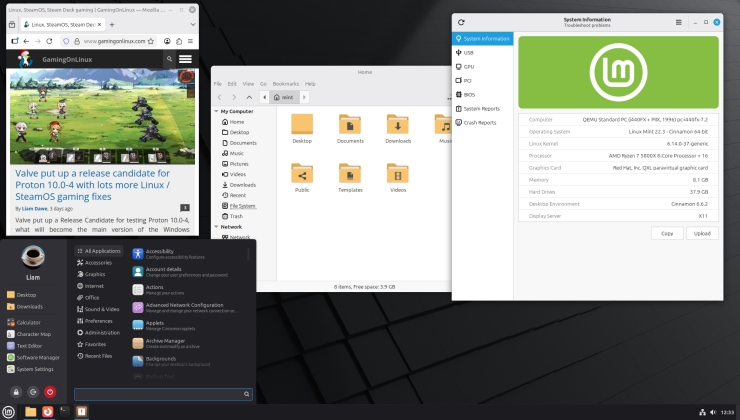Were you hoping to easily play Fortnite on the upcoming Steam Deck? Well, Tim Sweeney the Epic Games CEO has made it clear that it's not going to happen officially. The thing to remember right now is that both Easy Anti-Cheat and BattlEye do support Linux. Both for native Linux builds and for Windows games run through Steam Play Proton. However, it's all user-space with no Kernel modules.
On Twitter, user Stormy178 asked if there were plans to make Fortnite compatible with Steam Play Proton to which Sweeney replied:
Fortnite no, but there's a big effort underway to maximize Easy Anti Cheat compatibility with Steam Deck.
The questioning continued and when asked why, Sweeney followed up with:
We don’t have confidence that we’d be able to combat cheating at scale under a wide array of kernel configurations including custom ones.
Another user mentioned it seemed that Epic's CEO didn't trust their own product, Sweeney obviously couldn't let that remain unanswered with:
With regard to anti-cheat on the Linux platform supporting custom kernels and the threat model to a game of Fortnite's size, YES THAT'S EXACTLY RIGHT!
In a number of ways, he's actually right. Windows is closed source, so is the NT Kernel and usually 99% of drivers for it are too. Client-side anti-cheat obviously relies a lot on security by obscurity, so people can't see everything it's doing. This is part of the problem on Linux, where the Kernel and practically all development on it is done right out in the open and it changes rapidly. Developing anti-cheat against such an open Kernel probably isn't going to be even remotely easy. There will be ways though, especially if something like the Steam Deck had a fully signed Kernel and some sort of guarantee it's being used - probably numerous ways smarter people know of.
Really though, overall it doesn't give a lot of confidence for developers who might be looking to hook up their anti-cheat ready for their games to work on the Steam Deck.
The big difference it seems, is the size of the playerbase and how much of a target each game is. Sweeney is not saying it's not suitable as a whole, just that Fortnite is a massive target for cheaters:
The threat model for anti-cheat varies per game based on the number of active players and ability to gain profit by selling cheats or gain prominence by cheating. Hence anti-cheat which suffices for one game may not for another game with 10, 100, or 1000 times more players.
One user followed up by suggesting it was just a case of Sweeney not wanting Fortnite on a "rival's platform", to which Sweeney gave this answer:
Epic would be happy to put Fortnite on Steam. We wouldn't be happy to give Steam 20-30% of its revenue for the privilege. Supporting Steam Deck hardware is a separate issue, but the market for non-Steam-hosted games on limited availability Steam Deck hardware is how big exactly?
With that in mind, you're going to need Windows or to stream it via GeForce NOW on the Steam Deck. At least for games without such anti-cheat, you should be able to use the Heroic Games Launcher on the Steam Deck.
It does mean there's space open for another game to take its place on the Steam Deck officially.
Quoting: GuestValve anti cheat has been working for ever on Linux... how come? are valve devs super smart and Epic Games devs dumb af?In VAC's case, "working" is really an abuse of the English language :P
Still, it's not so much a matter of it working in technical terms as it is a matter of it working in efficiency terms. Valve has a vested interest in adding its games to the Steam Deck's catalog, and thus is determined to shoulder the burden of providing the additional support for them, which is made all the more easier since VAC is crap as an anti-cheat anyway.
Epic most definitely does not have that same vested interest, and so it flat out denies having to shoulder 10x of the same effort for its 10x more popular game. But on the other hand, in technical terms, by making EAC available for Proton it has not denied other companies the right/ability to use its in-house anti-cheat for their own products, if they so want.
Quoting: NociferNo, I'm disagreeing with you because you contradicted yourself. "It really depends" agrees with "the malware capabilities will be limited by the size of the hole", a statement with which you disagreed in the rest of your comment. If it does depend on the "size of the hole", then it also does make sense in the digital world to talk about holes and sizes.Question to ponder: How can you measure the size of a bug? I say that you can measure the amount of consequences of a certain exploit of a bug. But you can't measure the bug itself, which is what I meant.
Quoting: Doc AngeloSo it goes without saying that I do not think the argument is stupid, and I don't agree with your explanation about why it's stupid.I don't see an argument, just a statement that you don't agree - which is of course fine.
IDK if and how much he knows about Linux, but it looks like he's just throwing random things out there as an explanation why his company won't do something hoping they get repeated all over and the more people he convinces the Steam Deck is not for them the better for him.
If someone installs Windows on it they become just another Windows user Epic have to do nothing more to support. And that is that.
Quoting: EhvisThat's the whole point, it can't be fixed. It isn't even really working right now. What he says is correct. Windows has a limited set of binaries coming from Microsoft and other driver developers.I'm sorry but this is a big understatement, Windows have a lot of drivers, any hardware manufacturer can make they own driver, and all they need is to have some contract with windows in order to have it sign, which is most certainly a lot less strict into accepting code in kernelland than Linux, as
Linux you have to go though the review process, windows, it's mostly just showing the wallet.
Quoting: EhvisThe Linux kernel can be configured in any number of ways that lead to a near infinite number of possible binaries. And if you rely on knowing what is there, then you have an unsolvable problem.Yeah that's why red hat(not 100% the feature was made by red hat) develop they way to know if suspicious core are running in kernel land: https://www.kernel.org/doc/html/latest/admin-guide/tainted-kernels.html.
So you can know if suspicious code is running in Linux.
Quoting: damarrinIDK if and how much he knows about Linux, but it looks like he's just throwing random things out there as an explanation why his company won't do something hoping they get repeated all over and the more people he convinces the Steam Deck is not for them the better for him.He simply doesn't like Linux, for whatever reason. Which leads him to ridiculous statements like this one: https://twitter.com/timsweeneyepic/status/964284402741149698?lang=en
Quoting: GuestAnticheat is so dumb. It's just like DRM... The only thing that reliable stops cheating is a paywall, but that of course would destroy games like fortnite. The only remotely acceptable anticheat is VAC anyway. That one doesn't need access to your credit card either.Or my preferred solution - private servers. But then they can't sell you hats.
Quoting: ZlopezYou can do the same on Windows, it's just more difficult.the entire point of linux is that you CAN customize stuff without worrying about reverse enginering anything, "you can do the same on windows" aply to anything if you put enough effort into it, why are you using linux if "you can do the same on windows"?
Quoting: ZlopezI don't thing even on Linux most cheaters would ever want to mess with their kernel, just to be able to cheat in some game.sigh.
cheaters dont write their own tools anymore, its not 1998 anymore where most code were bad written to the point that you can just press alt+f4 to skip windows login screen instead of typing user name+ password.
the only reason why we have cheaters nowadays in those big games is because there is a whole industry arround it, millions of persons purchasing softwares writen by thousands of employees.
on linux, those employees can simply fork ubuntu , customize the kernel and relase the "cheatOS".
did you see the issue here?
Quoting: ZlopezPasswords are not software (it's just string and the servers should only store hash and add salt as well), so I don't think the anti-cheat software is just password that should benefit from security by obscurity.its not password, but its akin to it, in the sense that the security is that you dont know exactly what it does to make sure you arent cheating.
for example, if you knew that it check if you are running any process named: "famousCheatingTool.exe " and if you are, kick you out of the game, then you know that you can just rename famousCheatingTool to famousCheatingTool2.exe or definitelyNotFamousCheatingTool.exe, and dodge the anti cheat solution.
the same goes for any suspect activity on the memory etc.
i dont know how an anti cheat work exaclty, but not knowing is exactly the point, its IMPOSSIBLE to stop people from controlling their own computer, just like DRM didnt stoped people from copying something, it can only delay the stuff.
the main difference here is:
once you break the DRM of one music, you can make as many copies of it as you want.
once you break an anti cheat, you can connect to their servers for a little while,but then they update their software and you have to find another way to break their anti cheat stuff.
meanwhile , they may detect that you were using this cheating solution and ban you, unless the cheating solution figure out that they found their code pattern and change to a new working solution fast enough to avoid the cheating detection and avoid your ban.
Quoting: ZlopezThis is a correct point, but the freedom of one person ends where freedom of others begins. I don't care if people are cheating in online games at all, it's their choice, but they should do it with the permission of others. I cheated multiple times with my friends on LAN parties, but just for fun and with them knowing.to do that you still have to detect that they are cheating.
It will be best to just put cheater in the same match with other cheaters, so they can have fun together. :tongue:
Last edited by elmapul on 8 Feb 2022 at 2:25 pm UTC
Quoting: XpanderHe probably has all the statistics and knows the insides, So i think he is right. I find it stupid that people just start calling out with names for no reason though :( but i guess its the internet.But he's probably not technically savvy enough to give an answer that is outside the monetary side of the issue.
But thats probably bad news for every other big game like Apex Legends and so on also sadly.
If the only issue with Linux kernel is the fact that you can modify drivers, then you have the same issue with Windows as there is no limitation or whatsoever if I want to install a not signed driver. And iirc, Deck was going to use a non modifiable boot image, so it may even have an advantage against Windows PCs regarding anti cheat security.
However, I could go at great lengths arguing against the usefulness of anti-cheat.
I'll try to make it short. If it were left to me, I'd:
- have pro players play in controlled environments during tournaments
- let competitive players opt-in to stronger anti-cheat measures, like in-kernel/streaming
- relax anti-cheat measures in casual lobbies
- let people play without anti-cheat...
- ... and I would even integrate cheat inside the game
For instance: playing against your friend who is much better than you? Add a bit of aimbot to make it more fun/interesting to everyone. Just make it clear in online lobbies who uses what, and give players the ability to opt out from playing with "cheating" players. Also pit players vs (player+cheat) at similar skill levels. Well, just my 2c.
Oh, of course that can't really work with some business models of selling cosmetics, probably not if trying to extract maximum value. With cosmetics, you need a big, unified player pool to address.
Quoting: NociferExactly. The fact alone that Epic a.k.a. Tim Sweeney has already collaborated with Valve to bring official EAC support to Proton and the Steam Deck points to him at least sincerely believing what he says about Fortnite. He didn't block Proton from using EAC, it's rather the opposite, even though he could. And after all, EAC is one product (and its use affects the game companies that opt to enable it, not Epic) and Fortnite is another product - a company can have vastly different strategies for its different products, according to the target market for them.not to mention that their investment to port EAC to linux, may be enough to guarantee that the cheaters will not have enough of a demand to hack other games, but hacking fortinite will raise the demand, and it may raise enough that their investiments would render useless.
in other words, bringing fortinite may be enough to kill EAC on linux and all the other games in the process...
Quoting: Doc AngeloI'm not talking about exact numbers either. Maybe I was unclear about what I mean with "the other way around". I am saying that there are 10 times more Linux users than Fortnite players. That's why I asked if you mean Linux gamers or Linux users.sigh
first off , windows has about 1.5 billion of users with 90% of marketshare, linux has 1%, wich is about 16.7 millions.
some statistics vary the number of users, the best data that i saw say it have 5% of marketshare, lets work with that number.
at the best case scenario 83,5 millions of users. (excluding android)
the last time i checked, fortinite had 250 millions of players.
not all pc or linux users are gamers, not all gamers play fortinite.
so why do you think linux has more users than fortinite has players?
maybe on pc, considering fortinite is also avaliable for android, iOS, playstation, xbox and i think switch.
Quoting: elmapul(excluding android)You've written so much, and even this in particular, but you're still not seeing it. I'm gonna leave it at that.
Quoting: elmapulThere probably are more Linux users than Windows users (phones, routers, ... toasters?)...Quoting: Doc AngeloI'm not talking about exact numbers either. Maybe I was unclear about what I mean with "the other way around". I am saying that there are 10 times more Linux users than Fortnite players. That's why I asked if you mean Linux gamers or Linux users.sigh
first off , windows has about 1.5 billion of users with 90% of marketshare, linux has 1%, wich is about 16.7 millions.
... but that doesn't help Fortnite on Linux.
WINE allows dll side-loading, so one can easily use a modded d3dx100500.dll with some functions (like drawing of walls or other effects) dummied-out and a modified custom Linux kernel would report everything is fine. User's access to kernel is a 0-level vulnerability in the "trust-chain". That is why WINE/Linux is not, and shall never be treated as "secure" platform. All hopes that a "client-side" anti-cheat will be a thing on WINE are just pipe dreams.
Linux and client-side anti-cheat systems are antithetical to each other as the very ideology of client-side anti-cheat measures is to strip user of any control of one's personal computer. From "trusted computing", through cryptographic measures down to "security through obscurity" concept. And Linux in particular and Open Source in general are against it all (see "libdvdcss").
Quoting: Alm888User's access to kernel is a 0-level vulnerability in the "trust-chain". That is why WINE/Linux is not, and shall never be treated as "secure" platform. All hopes that a "client-side" anti-cheat will be a thing on WINE are just pipe dreams.Is there anything that can be considered a secure platform, where nothing can be loaded before the anti-cheat is loaded?
Quoting: EikeThere probably are more Linux users than Windows users (phones, routers, ... toasters?)...i dotn think you read the context
... but that doesn't help Fortnite on Linux.
Quoting: crt0megaAs much as I'd love to say fsck Tim and Epic, I can't blame him on this one.I still say fuck that dude. Somehow Epic went from one of the few companies supporting native Linux gaming to absolutely hating on them. While Unreal Engine is ported and works great on Linux, there still are far too few Unreal Engine games ported to it natively.
Thing about Anti-Cheat and kernels... well why does it even need kernel hooks? That seems kind of scary to me, if the anti-cheat crashes, it's more likely to take the kernel with it. Even if they insisted on that, couldn't they use a dkms style kernel module that does it? Granted it isn't like most users would know how to install such things... and I think that's what it comes down to, is they want root access to your system to install a game, and he knows damn well most Linux users are going to basically say what I just said, 'Fuck off, Tim.'
Quoting: Doc AngeloI still remember the day when we thought all copy protection / DRM checks wouldn't work through wine. You had to download a NoCD crack from some shady ass website to get Wine to work with a lot of games...Quoting: Alm888User's access to kernel is a 0-level vulnerability in the "trust-chain". That is why WINE/Linux is not, and shall never be treated as "secure" platform. All hopes that a "client-side" anti-cheat will be a thing on WINE are just pipe dreams.Is there anything that can be considered a secure platform, where nothing can be loaded before the anti-cheat is loaded?
Guess what? Most just work now, you can legitimately take a CD based game like Pool of Radiance; Ruins of Myth Drannor, put the CD in, install it via Wine, start the game up, and it'll ask for the second disc, and pop that in and mount it and the game will launch and run just fine!
So never say never... for the Anti-Cheat stuff, something like Flatpak, where it sandboxes the entire app away would be a method to use on such things.
Quoting: TermyOn the one hand, Fortnite isn't big loss. On the other hand - spreading such fear is just bullshit. The same bullshit as the claim they would have to give valve 20-30% - it's not apple, if you have your own payment option ingame, 0% of that goes to valve (if i'm not completely mistaken).Oh, right, I hadn't even spotted that. Fortnite is free to play, so Sweeney is saying he'd be happy to have Fortnite on Steam if he didn't have to pay 20% of zero! What a lying sack of . . .
It's always the same with Tim's tweets: best to ignore them as 99% is either useless bullshit or fearmongering bullshit...









 How to setup OpenMW for modern Morrowind on Linux / SteamOS and Steam Deck
How to setup OpenMW for modern Morrowind on Linux / SteamOS and Steam Deck How to install Hollow Knight: Silksong mods on Linux, SteamOS and Steam Deck
How to install Hollow Knight: Silksong mods on Linux, SteamOS and Steam Deck